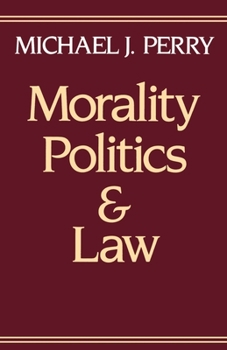Morality, Politics, and Law
Select Format
Select Condition 
Book Overview
Addressing the proper relation of moral and religious belief to politics and law, especially constitutional law, Perry here discusses whether a common moral foundation exists that is capable of providing, in a diverse social system like ours, consistent guidelines for handling divisive political, policy, religious and constitutional disputes. His study represents a distinctive position in the vast and growing literature on the moral foundations of...
Format:Paperback
Language:English
ISBN:0195064569
ISBN13:9780195064568
Release Date:May 1990
Publisher:Oxford University Press
Length:336 Pages
Weight:0.85 lbs.
Dimensions:0.9" x 5.5" x 8.3"
Customer Reviews
1 rating
Very good discussion for law or philosophy buffs!
Published by Thriftbooks.com User , 21 years ago
This is the type of book that, unfortunately, is lacking within the legal profession. Perry is a law professor who concerns himself with religious and/or moral issues in law and politics. How is morality reflected in law? What is laws proper sphere when legislating morality? Can neutrality ever be a viable option amongst a pluralistic society? These are the questions Perry asks in this book. His answers: 1.) all laws are reflections or morality, 2.) we 'should' refrain as much as possible but 'should' is only a guideline, and 3.) No. Neutrality is contra democracy. Of course, mine is just a summation. The book is roughly two-hundred pages of text with extensive endnotes taking up 100 pages themselves. The first part of Perry's book focuses on the question: In a pluralistic society, are consensus, objective claims to moral knowlege, or moral neutrality in law reasonable goals? Perry says no. He is not a moral skeptic who argues qua Mackie that moral knowledge doesn't exist. Rather he is an epistemic relativist. (read the book to find out more) It is this relativism, and the subsequent belief that moral and political consensus, while desirable, is a bit chimeric that fuels the rest of the book.The next part of the book focuses on the possibility of a liberal (meaning either neutral or equalitarian) theory of moral legislation. Perry again is skeptical, taking on Rawls, Dworking (ewwww...Dworkin!!) and Ackerman, finding them wanting. He then outlines his suggestion on his theory. (read the book to find out more)To close, he outlines his 'non-originalist' view of constitutional interpretation. Interpreting the constitutioin as a.) a living blueprint and b.) a set of aspirations handed down from the framers, Perry argues, is most consistent with his moral and political theories. I don't agree and, after reading the book, fail to see that Perry adequately connected this legal view to his above moral and political ones but...hey...more for his sequel to explain, right? (I think it's called "Love and Politics" or something akward like that). Overall, good read, thought provoking, and on a subject badly neglected by both philosophers and law students.






